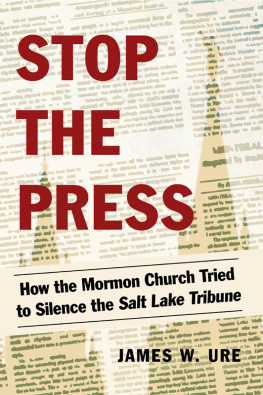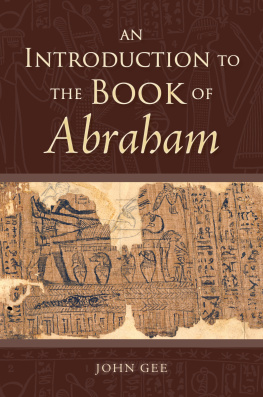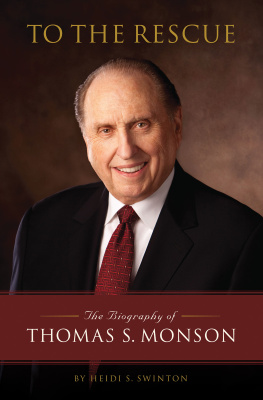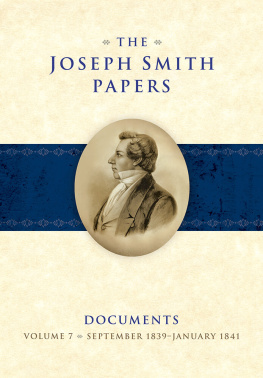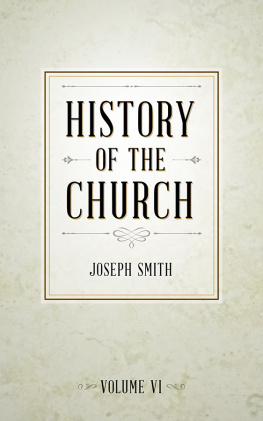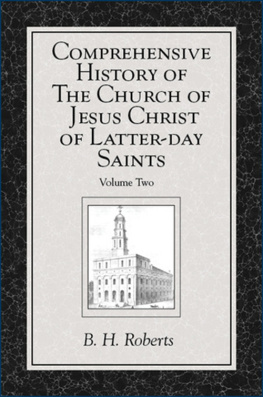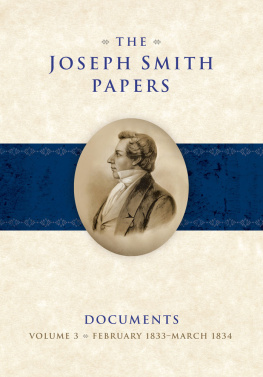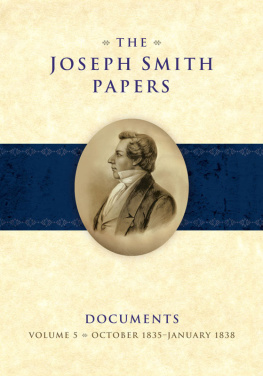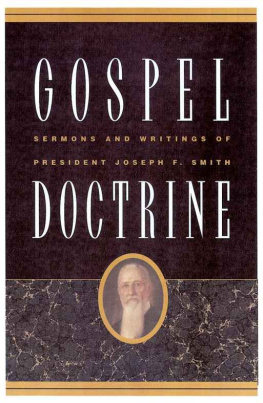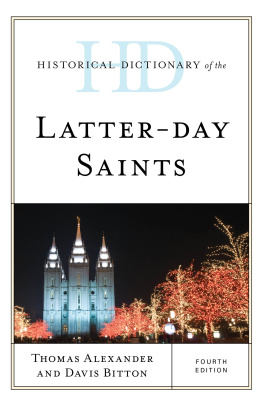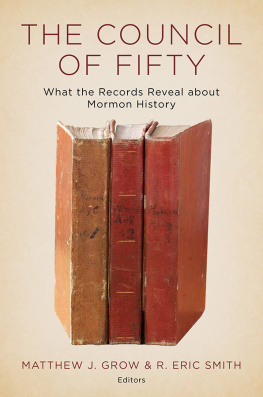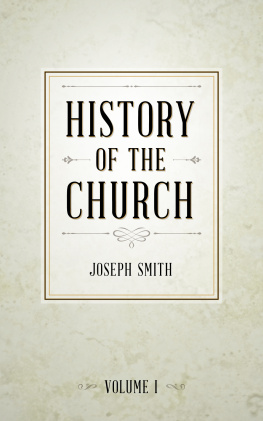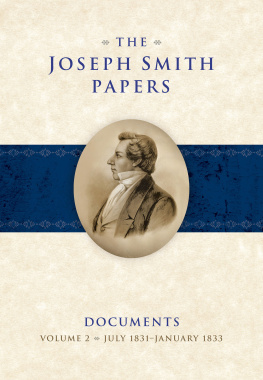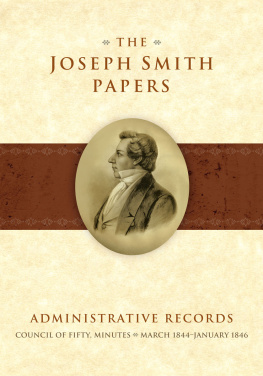Church of Jesus Christ of Latter-day Saints - The Joseph Smith papers. Council of Fifty, Minutes: march 1844-january 1846
Here you can read online Church of Jesus Christ of Latter-day Saints - The Joseph Smith papers. Council of Fifty, Minutes: march 1844-january 1846 full text of the book (entire story) in english for free. Download pdf and epub, get meaning, cover and reviews about this ebook. year: 2016, publisher: Deseret Book Company, genre: Religion. Description of the work, (preface) as well as reviews are available. Best literature library LitArk.com created for fans of good reading and offers a wide selection of genres:
Romance novel
Science fiction
Adventure
Detective
Science
History
Home and family
Prose
Art
Politics
Computer
Non-fiction
Religion
Business
Children
Humor
Choose a favorite category and find really read worthwhile books. Enjoy immersion in the world of imagination, feel the emotions of the characters or learn something new for yourself, make an fascinating discovery.
- Book:The Joseph Smith papers. Council of Fifty, Minutes: march 1844-january 1846
- Author:
- Publisher:Deseret Book Company
- Genre:
- Year:2016
- Rating:4 / 5
- Favourites:Add to favourites
- Your mark:
- 80
- 1
- 2
- 3
- 4
- 5
The Joseph Smith papers. Council of Fifty, Minutes: march 1844-january 1846: summary, description and annotation
We offer to read an annotation, description, summary or preface (depends on what the author of the book "The Joseph Smith papers. Council of Fifty, Minutes: march 1844-january 1846" wrote himself). If you haven't found the necessary information about the book — write in the comments, we will try to find it.
Church of Jesus Christ of Latter-day Saints: author's other books
Who wrote The Joseph Smith papers. Council of Fifty, Minutes: march 1844-january 1846? Find out the surname, the name of the author of the book and a list of all author's works by series.
The Joseph Smith papers. Council of Fifty, Minutes: march 1844-january 1846 — read online for free the complete book (whole text) full work
Below is the text of the book, divided by pages. System saving the place of the last page read, allows you to conveniently read the book "The Joseph Smith papers. Council of Fifty, Minutes: march 1844-january 1846" online for free, without having to search again every time where you left off. Put a bookmark, and you can go to the page where you finished reading at any time.
Font size:
Interval:
Bookmark:
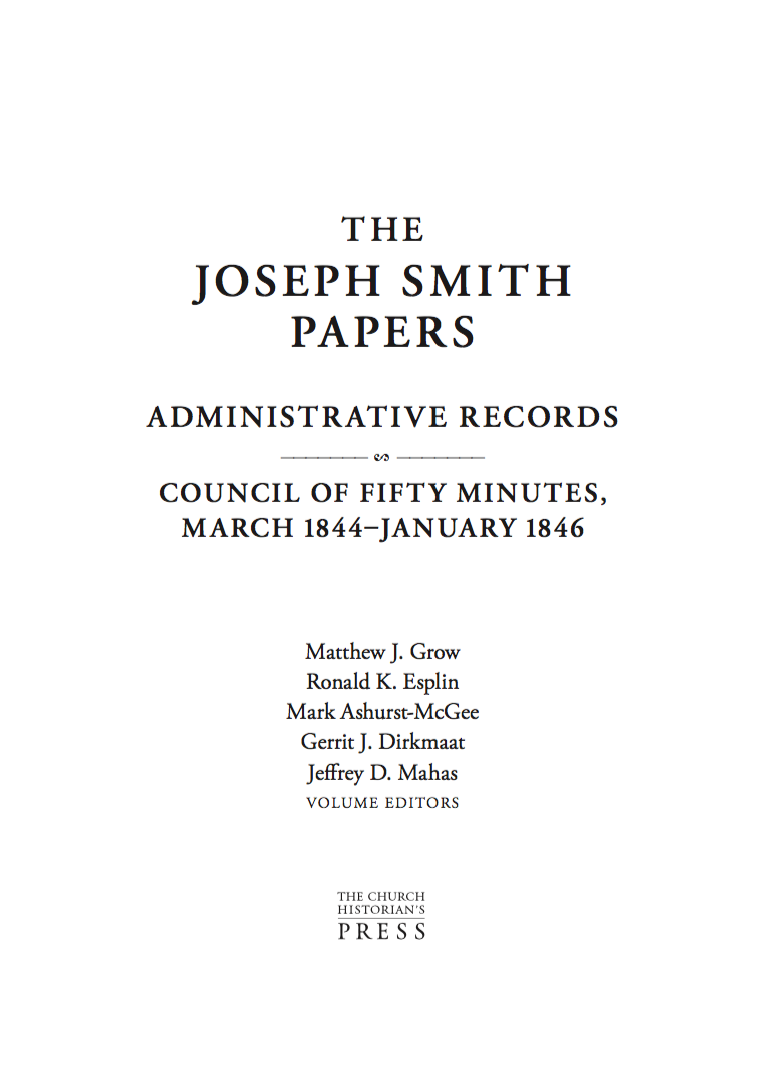
2016 by Intellectual Reserve, Inc. All rights reserved.
The Church Historians Press is an imprint of the Church History Department of The Church of Jesus Christ of Latter-day Saints, Salt Lake City, Utah and a trademark of Intellectual Reserve, Inc.
josephsmithpapers.org
The Joseph Smith Papers Project is endorsed by the National Historical Publications and Records Commission.
Art direction: Richard Erickson.
Cover design: Scott Eggers. Interior design: Richard Erickson and Scott M. Mooy.
Typography: Alison Palmer.
E-book: Ben Ellis Godfrey.
Library of Congress Cataloging-in-Publication Data
Names: Council of Fifty (The Church of Jesus Christ of Latter-day Saints), author. | Grow, Matthew J., editor. | Esplin, Ronald K., editor. | Ashurst-McGee, Mark, editor. | Dirkmaat, Gerrit John, editor. | Mahas, Jeffrey D., 1986 editor. | Smith, Joseph, Jr., 18051844. Joseph Smith papers.
Title: Council of Fifty minutes, March 1844January 1846 / Matthew J. Grow, Ronald K. Esplin, Mark Ashurst-McGee, Gerrit J. Dirkmaat, Jeffrey D. Mahas, volume editors.Description: Salt Lake City: The Church Historians Press, [2016] | 2016 |
Series: Joseph Smith papers. | Includes bibliographical references and index.Identifiers: LCCN 2016006296 (print) | LCCN 2016008138 (ebook) | ISBN 9781629722429 (hardbound: alk. paper) | ISBN 9781629734439 (ebook)
Subjects: LCSH: Council of Fifty (The Church of Jesus Christ of Latter-day Saints)HistorySources. | The Church of Jesus Christ of Latter-day SaintsHistory19th centurySources. | Mormon ChurchHistory19th centurySources. | Corporate minutes. | LCGFT: Minutes (Records)
Classification: LCC BX8611.C665 2016 (print) | LCC BX8611 (ebook) | DDC 262/.09dc23LC record available at http://lccn.loc.gov/2016006296
Printed in the United States of America on acid-free paper.
10 9 8 7 6 5 4 3 2 1
Contents
Council of Fifty, Minutes, March 1844January 1846
Reference Material
Organizational Charts
Illustrations and Maps
Textual Illustrations
Contextual Illustrations
Maps
Other Visuals
The Joseph Smith Papers
Church History Department Executives
Steven E. Snow
Richard E. Turley Jr.
Reid L. Neilson
Director of Publications
Matthew J. Grow
Managing Historian
Matthew C. Godfrey
Associate Managing Historian
Robin Scott Jensen
National Advisory Board
Richard Lyman Bushman
Terryl L. Givens
Dean C. Jessee
Laurie F. Maffly-Kipp
Susan Holbrook Perdue
Stephen J. Stein
Harry S. Stout
Editorial Manager
R. Eric Smith
Associate Editorial Managers
Nathan N. Waite
Riley M. Lorimer
Senior Research and Review Editor
Richard L. Jensen
Contributors to This Volume
Editorial Staff
R. Eric Smith, Lead Editor
Rachel Osborne
Shannon Kelly
Document Specialists
Kay Darowski
Joseph F. Darowski
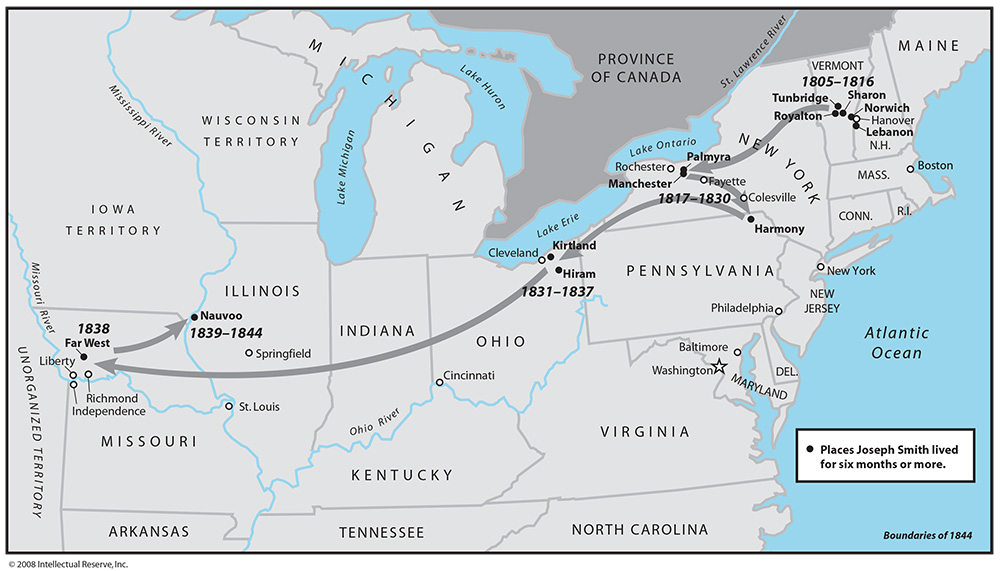
Joseph Smiths residences. Joseph Smiths major places of residence and the general direction of his migrations. (Design by John Hamer.)
View high-resolution image here: http://bit.ly/1tjtZRB
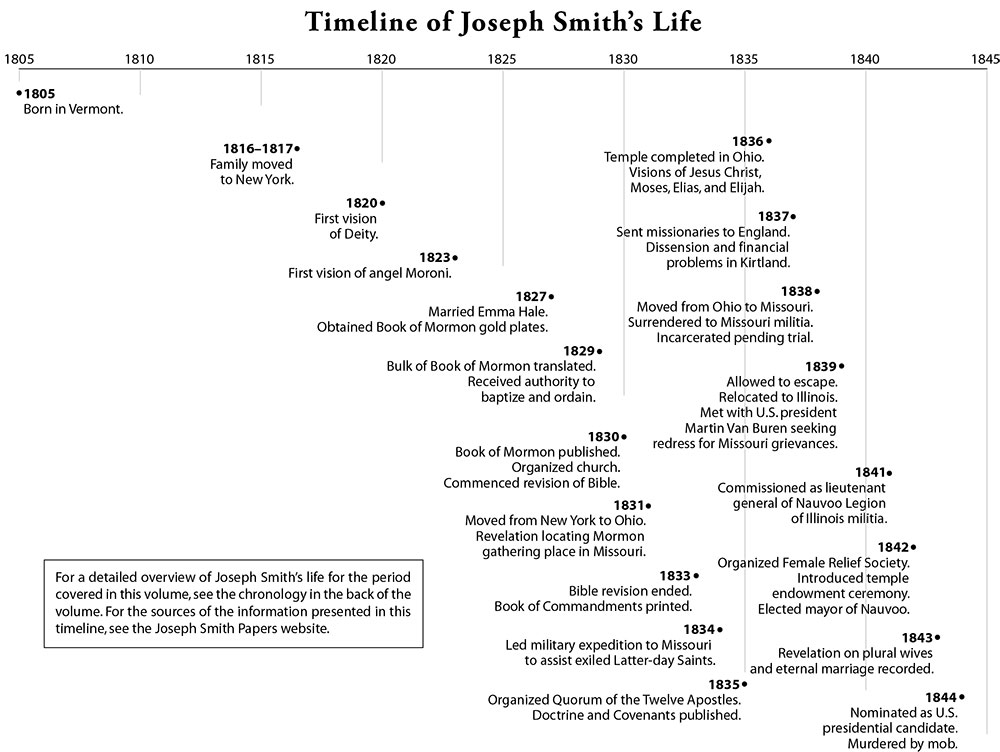
View high-resolution image here: http://bit.ly/1w6ymnn
Detailed Contents
Part 1: MarchJune 1844
Part 2: FebruaryMay 1845
Part 3: SeptemberOctober 1845
Part 4: January 1846
Appendixes
SERIES INTRODUCTION
Joseph Smiths Administrative Records
Joseph Smiths youthful quest for personal redemption and religious truth resulted, according to his accounts, in a series of revelatory experiences that thrust him into leadership of a new religious movement. The fourteen years from the organization of the church in 1830 to Smiths death in 1844 were turbulent times for its adherents, fraught with violent external opposition and major episodes of internal dissension. Yet a remarkably resilient core of people and practices developed and flourished. Outside observers were sometimes surprised at what they saw as the churchs cohesiveness.
Key to understanding Joseph Smiths leadership and his governance of the Church of Jesus Christ of Latter-day Saints is an extensive array of records created for administrative purposes that constitute the Administrative Records series of The Joseph Smith Papers. Although record keeping was sometimes inconsistent and incomplete, especially in the early years of the churchs existence, Smith and other church leaders persisted in their attempts to create and preserve records. These efforts undoubtedly contributed to the growth, survival, and vitality of the church.
The administrative records are a complicated and sometimes confusing body of materials, reflecting both the complexity of the churchs organizational structure as it developed over Joseph Smiths administration and the difficult circumstances under which the record keepers labored. The series includes records of the organizations in which Joseph Smith was involved as an administrator, records that were housed in his office, and records of meetings and initiatives in which he played a large part, such as church conferences and his 1844 presidential campaign. Among the records are books of certificates and licenses that he signed or that were signed by others on his behalf and kept under his direction.
All of these records will be available on the Joseph Smith Papers website, josephsmithpapers.org, and some of the records will be published in print. In addition to the administrative records most closely associated with Joseph Smith, the website provides records of organizations in which Smith had some involvement, including minutes of the Quorum of the Twelve Apostles (organized in 1835), the Nauvoo high council (1839), and the Female Relief Society of Nauvoo (1842). Excerpts from many of the administrative recordsincluding correspondence, minutes of meetings, and financial documentswill appear, with annotation, in the Documents series of The Joseph Smith Papers.
A Joseph Smith revelation dating from the formal organization of the church in April 1830 mandated that the church keep records. Church leaders began creating and retaining administrative records almost immediately and continued this effort throughout Smiths lifetime and beyond. The bulk of the Smith-era records were created from 1839 to 1844, when church headquarters were in Nauvoo, Illinois. Fewer records survive from New York, Ohio, and Missouri (each of which was the center of church activity for a time) in part because of the forced evacuation of church members from some of these locations. The creation of additional administrative bodies in Nauvoo provides another reason that more records exist for the churchs sojourn there.
The surviving administrative records can be grouped into various categories, each with its own history of clerks and scribes.
Minutes of Conferences and Councils
The foundational Articles and Covenants of the church directed that church business be conducted in meetings of the churchs elders. Most of the meetings for which Whitmer copied or kept minutes took place in Jackson, Clay, and Caldwell counties, Missouri.
Neither the original minutes nor the bound volume that Whitmer apparently prepared is extant. However, sometime between April and June 1838, Ebenezer Robinson and Levi Richards copied the minutes from Whitmers record into another bound volume. Minutes taken by Robinson from 3 March 1838 through 16 January 1839 and minutes of two June 1844 meetings held in Nauvoo were subsequently copied into the volume.
Font size:
Interval:
Bookmark:
Similar books «The Joseph Smith papers. Council of Fifty, Minutes: march 1844-january 1846»
Look at similar books to The Joseph Smith papers. Council of Fifty, Minutes: march 1844-january 1846. We have selected literature similar in name and meaning in the hope of providing readers with more options to find new, interesting, not yet read works.
Discussion, reviews of the book The Joseph Smith papers. Council of Fifty, Minutes: march 1844-january 1846 and just readers' own opinions. Leave your comments, write what you think about the work, its meaning or the main characters. Specify what exactly you liked and what you didn't like, and why you think so.


